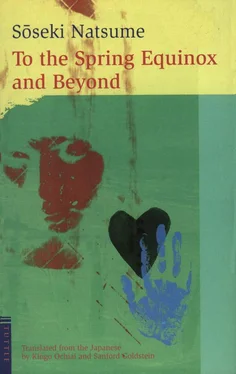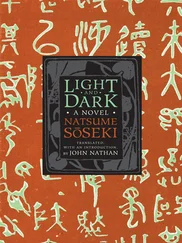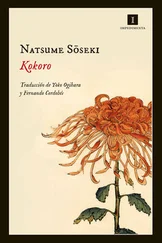Natsume Soseki - To the Spring Equinox and Beyond
Здесь есть возможность читать онлайн «Natsume Soseki - To the Spring Equinox and Beyond» весь текст электронной книги совершенно бесплатно (целиком полную версию без сокращений). В некоторых случаях можно слушать аудио, скачать через торрент в формате fb2 и присутствует краткое содержание. Год выпуска: 2006, Издательство: Tuttle Publishing, Жанр: Классическая проза, на английском языке. Описание произведения, (предисловие) а так же отзывы посетителей доступны на портале библиотеки ЛибКат.
- Название:To the Spring Equinox and Beyond
- Автор:
- Издательство:Tuttle Publishing
- Жанр:
- Год:2006
- ISBN:нет данных
- Рейтинг книги:5 / 5. Голосов: 1
-
Избранное:Добавить в избранное
- Отзывы:
-
Ваша оценка:
- 100
- 1
- 2
- 3
- 4
- 5
To the Spring Equinox and Beyond: краткое содержание, описание и аннотация
Предлагаем к чтению аннотацию, описание, краткое содержание или предисловие (зависит от того, что написал сам автор книги «To the Spring Equinox and Beyond»). Если вы не нашли необходимую информацию о книге — напишите в комментариях, мы постараемся отыскать её.
To the Spring Equinox and Beyond — читать онлайн бесплатно полную книгу (весь текст) целиком
Ниже представлен текст книги, разбитый по страницам. Система сохранения места последней прочитанной страницы, позволяет с удобством читать онлайн бесплатно книгу «To the Spring Equinox and Beyond», без необходимости каждый раз заново искать на чём Вы остановились. Поставьте закладку, и сможете в любой момент перейти на страницу, на которой закончили чтение.
Интервал:
Закладка:

"The truth is that I've come without having been told anything about you by Mr. Taguchi. Are you using the words 'high-class idler' in their literal sense?"
"I'm literally an idler. Why do you ask?"
Matsumoto placed his elbows on the rim of the large brazier and with his jaw supported by one of his fists looked at his visitor. His manner, which apparently indicated he did not really consider Keitaro a guest he was meeting for the first time, had to be, Keitaro was convinced, truly characteristic of high-class idlers. He seemed to delight in smoking and occasionally puffed at the big-bowled Western pipe that was perpetually in his mouth, the smoke like a signal fire giving evidence that the pipe was still lit. His features — features which evinced no need to guard his thought against anyone — coupled with the way in which the smoke vanished around the side of his face gave Keitaro a kind of tranquil feeling he had never experienced with anyone before. His thinning hair was parted in the middle and consequently made the crown of his head seem even more normal and composed. Furthermore, he was dressed in a haori of solid brown, a color seldom worn, and he had on a pair of brown tabi over a white pair. The brown color at once suggested to Keitaro a monk's habit and made him feel that Matsumoto looked all the more singular, all the more unusual. He was the first man Keitaro had ever heard call himself a "high-class idler," and his behavior and attitude took Keitaro by surprise and hurled into his mind the impression that he was certainly typical of such a class of men.
"Pardon me for asking, but do you have a large family?" Though Keitaro did not know why, he wanted before anything else to put this question to this so-called high-class idler.
"Yes, I have quite a few children," Matsumoto replied, another burst of smoke coming from his pipe, which Keitaro had almost forgotten about.
"And a wife?. ."
"Of course I have a wife. Why?"
Keitaro regretted his stupid question, which now he couldn't take back, and he remained at a loss on how to get out of it. Not that Matsumoto looked that offended by the inquiry, but since he was staring as though expecting an explanation, Keitaro found himself required to say something.
"I asked only because I wondered how a person like you could lead a family life as ordinary people do."
"A family life? Why couldn't I? Because I'm a high-class idler?"
"Not necessarily, but I guess I did feel something along that line."
"Let me tell you, a high-class idler is more domestic than men like Taguchi."
Keitaro found himself unable to say anything further. In his mind were the embarrassment of having been stuck for an answer, the effort to change the subject at this point, and the desire to gain a clue through this question to Matsumoto's relationship with the woman in the leather gloves. These three were working together so that they cast even darker shadows over his mind, for even at the outset his thoughts had not been systematically organized.
Matsumoto, however, seemed not to care in the least what Keitaro thought, for he merely glanced coolly at his guest's embarrassed face. If Matsumoto were Taguchi, he would have shown brilliant tact, first dealing a neat blow for the impertinence of the inquirer and then, as soon as the blow had landed, turning the tables so that the other would have been saved from a clumsy stalemate — or so Keitaro thought. However, the man before him seemed to lack utterly the neat dexterity of dealing with people despite his ability to put them at ease. Keitaro was thinking that he had hit upon a difference between the two when, much to his relief, Matsumoto happened to ask, "Seems to me you haven't even bothered to think about such a problem, have you?"
"No, not ever."
"You have no need to think about it, do you? Since you're living alone in a boardinghouse. But even so, I imagine you sometimes think about the question of man versus woman, at least in a general way, don't you?"
"I guess you could say that I'm interested in it rather than that I've thought about it. Yes, of course I'm interested in it."

For a while they discussed this question which all human beings have an interest in. However, whether due to the difference in age or experience and background, Matsumoto's views on the subject were to Keitaro no more than a skeleton with all the flesh of vital importance removed, utterly lacking the incisive force with which to drive them into Keitaro's being and make them move irresistibly with his blood. On the other hand, Keitaro's desultory fragments lost their warmth as soon as they left his mouth, failing as they did to penetrate Matsumoto's mind.
In the course of this irrelevant talk, however, Keitaro heard an anecdote that sounded quite novel to him. It concerned the Russian writer Gorki, who had gone to America with his wife for the purpose of raising funds he thought essential for putting into practice the socialism he advocated. He was so popular, so busy with invitations and receptions, and making such steady and easy progress in attaining his objective that all things looked promising. Then the fact came to light that the woman accompanying him all the way from his homeland was not in fact his wife but his mistress. No sooner was this known than his fame, hitherto at its most enthusiastic height, fell off at once until no one the breadth and length of the New World would so much as shake his hand. And so Gorki was compelled to leave. That was the gist of the story.
"Therein lies that much difference between the Russian and American conception of the relations between the sexes. What Gorki did was so trivial it would hardly have caused public discussion in Russia. How nonsensical!" Matsumoto cried, a contemptuous look on his face.
"Which of the two," Keitaro offered, "is Japan more like?"
"More, I should think, like the Russian type. At least I'm for it," said Matsumoto, puffing away with another thick signal-fire outburst.
Inasmuch as the conversation had taken this turn, Keitaro began to feel he had nothing to fear in asking about the woman of the other day. "I believe I saw you the other night at a restaurant in Kanda," he began.
"Yes, we did see each other, didn't we? I remember you quite well. Furthermore, we were on the same streetcar on our way back, weren't we? You stayed on, it seems to me, as far as Edogawa. Is that near where you live? You must have had a bad time of it that night, caught in the rain."
Matsumoto had not indicated that he remembered Keitaro at the beginning of their interview, but neither was he pretending to have been made aware of it just now. His behavior suggested that it was all the same if he mentioned it or not. Whether Matsumoto's attitude came from naiveté, nerve, or inherent magnanimity, Keitaro could not tell.
"You were with someone. ."
"Yes, with a beautiful young woman. You were alone, I believe."
"Yes. You were alone too on your way back, weren't you?"
"So I was."
Their brief flow of brisk talk came to an abrupt end. Keitaro was waiting for some further word about the woman when he was asked a question that had nothing to do with her.
"Is your boardinghouse in Ushigome or Koishikawa?"
"It's in Hongo."
Matsumoto stared at Keitaro as though he had not understood.
When Keitaro saw that the look in his host's eyes seemed to be demanding an explanation of why he had gone to Edogawa if he lived in Hongo, he decided to make a clean breast of the matter rather than contrive some troublesome pretext. He resolved that if he angered Matsumoto, he would simply apologize, and if his host refused to accept this apology, he would politely bow and leave.
Читать дальшеИнтервал:
Закладка:
Похожие книги на «To the Spring Equinox and Beyond»
Представляем Вашему вниманию похожие книги на «To the Spring Equinox and Beyond» списком для выбора. Мы отобрали схожую по названию и смыслу литературу в надежде предоставить читателям больше вариантов отыскать новые, интересные, ещё непрочитанные произведения.
Обсуждение, отзывы о книге «To the Spring Equinox and Beyond» и просто собственные мнения читателей. Оставьте ваши комментарии, напишите, что Вы думаете о произведении, его смысле или главных героях. Укажите что конкретно понравилось, а что нет, и почему Вы так считаете.












